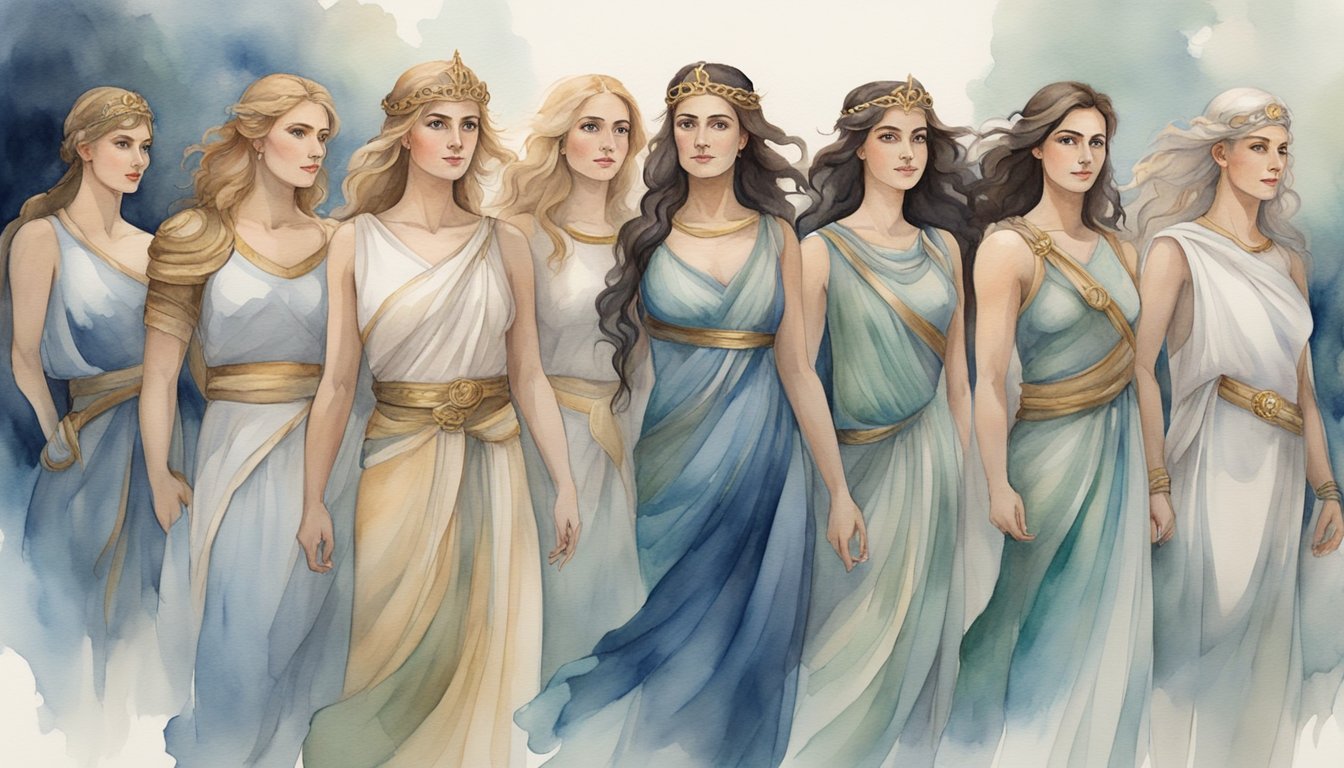Divine Feminine: Goddesses and Their Influence
Greek mythology is replete with powerful deities, among them the goddesses, who were central figures revered for their qualities and roles. They influenced everything from the ancient Greek concepts of marriage and beauty to strength and wisdom.
Hera: Queen of the Gods
Hera, the wife of Zeus, was known for her jealousy and veneration as the goddess of marriage and birth. The Greek narratives often depict her asserting her authority, attempting to maintain order in the face of Zeus’s many infidelities. Temples like the Heraion of Samos pay homage to her influence as a protectress of women.
Athena: Goddess of Wisdom and War
Athena, born from the forehead of Zeus, is celebrated as the patron of the city of Athens and the goddess of wisdom, courage, and warfare. Despite her martial associations, she was also a proponent of strategic warfare over physical confrontations, embodying a combination of intelligence and strength. The iconic Parthenon on the Athenian Acropolis is a testament to her revered status.
Aphrodite: Goddess of Love and Beauty
Aphrodite’s realm extended beyond mere physical allure; she was also instrumental in the storyline of legendary love stories and was worshipped for her association with fertility and the eternal cycle of life and death. Her temples, including the sanctuary on the island of Cyprus, were central to rites that celebrated her aspects of femininity and procreation.
Demeter and Persephone: Cycle of Seasons
As the goddess of harvest, Demeter’s significance in Greek mythology cannot be overstated, and her daughter Persephone’s abduction by Hades adds a layer of depth to her narrative, intertwining her story with themes of motherhood and the changing of seasons. Their dual roles illuminate ancient Greek values surrounding fertility and the natural world, with the Eleusinian Mysteries reflecting their combined importance in secret religious rites.
Discover more about Aphrodite’s temples and the roles of Hera, Athena, and Demeter and Persephone in Greek mythology through various literary works and archaeological sites dedicated to their worship.
Mortal Women: Heroines and Their Stories

In Greek mythology, mortal women stand as pivotal characters with stories that encapsulate everything from sorcery and tragedy to resilience and valor. They are portrayed as complex figures whose lives intertwine with gods, heroes, and the very fabric of myth itself.
Medea: Sorceress and Figure of Tragedy
Medea, a powerful sorceress, is a central figure whose life is marked by her assistance to Jason in his quest for the Golden Fleece. Her tale is one of intense love and betrayal, culminating in the ultimate act of murder as a response to Jason’s abandonment, casting her as both a perpetrator and, in some views, a victim of tragic circumstances.
Penelope: Loyalty and Cleverness
Penelope exemplifies patience and fidelity with her unwavering wait for her husband Odysseus’s return from the Trojan War. Renowned for her cunning and faithfulness, Penelope maintains her family and thwarts suitors through clever stratagems, highlighting her standing as a model of arete or virtue among mortal women.
Helen of Troy: Beauty and Chaos
Helen’s unparalleled beauty sparked the famed Trojan War, but her story delves deeper into themes of war and responsibility. Often seen as a cautionary tale, Helen’s abduction by Paris sets the stage for chaos, yet her character continues to be debated—is she a mere victim of the gods or an instigator of conflict?
Clytemnestra and Antigone: Rebellion and Morality
Clytemnestra, the wife of Agamemnon, embroils in a cycle of violence and revenge that leads to her husband’s murder, reflecting a narrative of female rebellion and the consequences of betrayal. In contrast, Antigone stands as a moral paragon, challenging King Creon and upholding divine law over mortal authority, shaping a legacy of righteousness and civil disobedience.
Atalanta and Amazons: Female Warriors and Their Legacy
Atalanta, an exceptional hunter, and the Amazons, a tribe of female warriors, defy conventional roles of women in ancient Greece. Their stories of strength and perseverance, with figures like Hippolyta leading Amazons, illustrate a subversion of normative gender roles, creating a narrative where women are valorous heroes in their own right.

